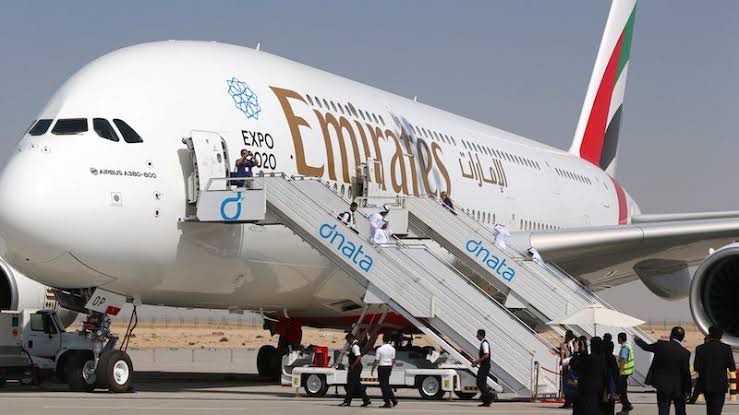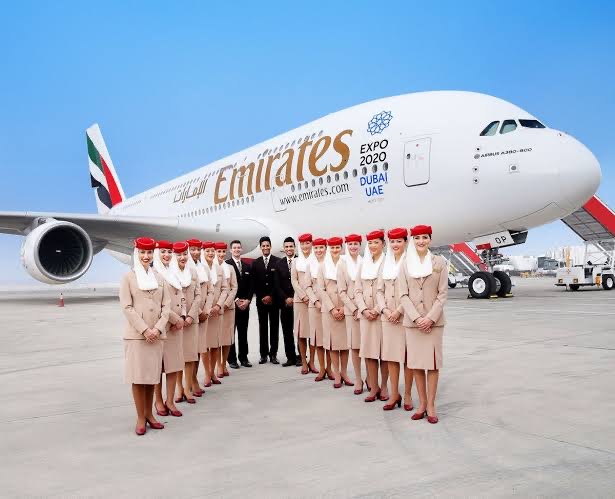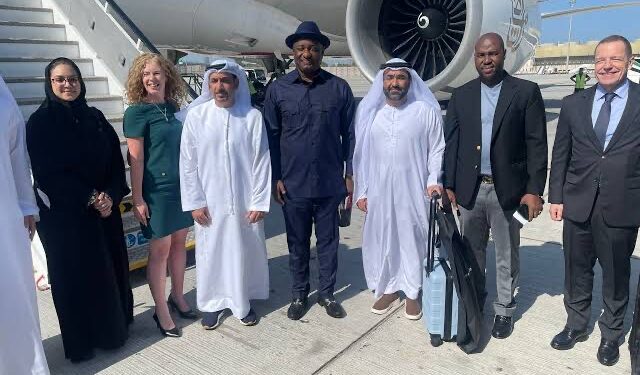The Minister of Aviation and Aerospace Development, Mr. Festus Keyamo, SAN, has announced a significant development in Nigeria’s aviation sector following the revised Bilateral Air Service Agreement (BASA) with the United Arab Emirates (UAE).
According to Keyamo, Nigerian airlines now have the freedom to operate flights to any airport within the UAE, a move that will boost competition and provide more travel options for Nigerian passengers.
Speaking at the Murtala Muhammed International Airport (MMIA) in Lagos upon his arrival on an Emirates Airlines flight, Keyamo emphasized the importance of the agreement and the resumption of Emirates’ operations in Nigeria.
Emirates Airlines suspended its flight services to Nigeria for over two years but resumed operations on October 1st, 2024, following the resolution of a long-standing issue related to the airline’s trapped funds in the country.
The Minister, along with several aviation officials, arrived in Nigeria on an Emirates flight, marking a significant milestone in the reopening of flights between the two countries.
In his remarks, Keyamo highlighted the benefits of the revised BASA agreement, which guarantees reciprocal rights for Nigerian airlines looking to operate flights to the UAE. “The first thing we did when we went to negotiate a new BASA with the UAE was to also secure the route for our local operators. Our agreement with them is that they fly to any destination, we fly to any destination in the UAE,” he said.

This marks a notable achievement in the ongoing efforts to strengthen Nigeria’s aviation industry and enhance its global connectivity.
Keyamo’s negotiation with the UAE authorities has ensured that Nigerian airlines will have full access to fly to cities such as Dubai and other key locations in the UAE, providing them with the opportunity to expand their international routes.
This development is not only expected to enhance the competitiveness of Nigerian airlines but also to benefit passengers by offering them more choices and potentially reducing travel costs.
The reopening of Emirates flights to Nigeria, according to Keyamo, is a positive step for the Nigerian people. He stated that the return of the airline would create healthy competition, which would ultimately lead to better pricing options for passengers.
“This is what this is all about, to ensure healthy competition and a healthy competition leads to competitive prices for the benefit of the Nigerian people,” he added.
Keyamo also recalled how some airlines had raised their ticket prices following Emirates’ suspension of operations in Nigeria, which made the government’s efforts to restore the airline’s services even more crucial.
He explained that Emirates’ return was particularly important because of the strategic role Dubai plays as a global travel hub. For Nigerian travelers, Dubai serves as a major transit point, connecting them to various international destinations with ease.
“For Nigerian travelers, it is easy to access any part of the world by simply traveling to Dubai and connecting any flight,” Keyamo explained. This makes the restoration of Emirates’ services a significant development for Nigerian travelers who rely on Dubai for international connections.
Furthermore, Keyamo revealed that Nigerian airlines would also benefit from code-sharing agreements with Emirates, which will help enhance their global reach.

He said, “For our airlines too, we have also secured some kind of code-sharing agreement. We have told them (Emirates) that if they want to code-share, our airlines would have the right of first refusal.”
This ensures that Nigerian airlines will have priority in entering into partnerships with Emirates, allowing them to offer joint services and expand their operational capacity.
The Minister also disclosed that Emirates is currently in discussions with several domestic carriers in Nigeria to explore the possibility of code-sharing arrangements.
These collaborations are expected to boost the local aviation sector and create more opportunities for Nigerian airlines to grow. By partnering with Emirates, domestic airlines will be able to offer more international flights and provide passengers with seamless travel experiences, which will further enhance Nigeria’s aviation landscape.
The return of Emirates Airlines and the revised BASA agreement between Nigeria and the UAE are being celebrated as major victories for Nigeria’s aviation industry.
The resolution of the issues that led to the suspension of Emirates’ services, including the trapped funds dispute, demonstrates the Nigerian government’s commitment to ensuring that international airlines can operate smoothly in the country.
It also reflects the government’s dedication to securing favorable agreements that benefit Nigerian airlines and passengers alike.
The resumption of Emirates flights and the new BASA agreement not only provide immediate benefits but also lay the foundation for future growth in Nigeria’s aviation sector.
As competition increases and more airlines enter the market, passengers can expect better service, more options, and lower prices. For Nigerian airlines, the agreement opens up new opportunities for international expansion, allowing them to compete on a global scale and enhance their service offerings.
Ultimately, the revised BASA with the UAE, coupled with the return of Emirates, signals a new chapter for Nigeria’s aviation industry.
The government’s proactive efforts to secure reciprocal rights for Nigerian airlines and foster competition in the market will have long-lasting positive effects on the sector, providing benefits to both travelers and the broader economy.
The aviation sector is poised for growth, and the groundwork laid by these recent developments will undoubtedly play a key role in shaping the future of air travel in Nigeria.


































